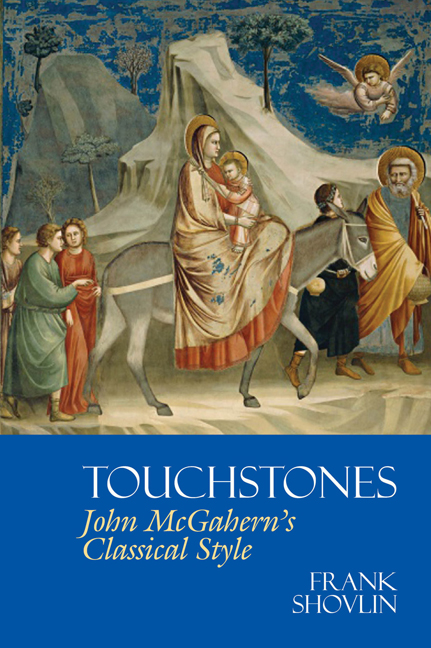Book contents
- Frontmatter
- Dedication
- Epigraph
- Contents
- Acknowledgements
- Touching Stones: Matthew Arnold and the Canon
- 1 We Other Clerks: James Joyce and the Classical Temper
- 2 A Walking Mirror: Stendhal, Horace, Nietzsche
- 3 One Lone Paperback: Tolstoy and Religious Sensibility
- 4 Magic: The Centrality of W. B. Yeats
- 5 Instinct: Douglas Stewart and Sex
- 6 The Fume of Muscatel: Yeats's Ghosts
- 7 Bohemian Rhapsody: Patrick Kavanagh and Generation X
- 8 Absurdity: Camus Comes to Clones
- 9 Aristocracy: Andrew Marvell, W. B. Yeats and the Curse of Cromwell
- 10 The Consolations of Nothingness: William Blake, W. B. Yeats and Prayer
- 11 Deliberate Happiness: W. B. Yeats and the Inner Life
- 12 Stranger in Paradise: Dante and Epic Style
- Conclusion: What Then?
- Bibliography
- Index
11 - Deliberate Happiness: W. B. Yeats and the Inner Life
from Touching Stones: Matthew Arnold and the Canon
- Frontmatter
- Dedication
- Epigraph
- Contents
- Acknowledgements
- Touching Stones: Matthew Arnold and the Canon
- 1 We Other Clerks: James Joyce and the Classical Temper
- 2 A Walking Mirror: Stendhal, Horace, Nietzsche
- 3 One Lone Paperback: Tolstoy and Religious Sensibility
- 4 Magic: The Centrality of W. B. Yeats
- 5 Instinct: Douglas Stewart and Sex
- 6 The Fume of Muscatel: Yeats's Ghosts
- 7 Bohemian Rhapsody: Patrick Kavanagh and Generation X
- 8 Absurdity: Camus Comes to Clones
- 9 Aristocracy: Andrew Marvell, W. B. Yeats and the Curse of Cromwell
- 10 The Consolations of Nothingness: William Blake, W. B. Yeats and Prayer
- 11 Deliberate Happiness: W. B. Yeats and the Inner Life
- 12 Stranger in Paradise: Dante and Epic Style
- Conclusion: What Then?
- Bibliography
- Index
Summary
Ille. For those that love the world serve it in action,
Grow rich, popular and full of influence,
And should they paint or write, still it is action:
The struggle of the fly in marmalade.
The rhetorician would deceive his neighbours,
The sentimentalist himself; while art
Is but a vision of reality.
What portion in the world can the artist have
Who has awakened from the common dream
But dissipation and despair?
Hic. And yet
No one denies to Keats love of the world;
Remember his deliberate happiness.
Ille. His art is happy, but who knows his mind?
I see a schoolboy when I think of him,
With face and nose pressed to a sweet-shop window,
For certainly he sank into his grave
His senses and his heart unsatisfied,
And made – being poor, ailing and ignorant,
Shut out from all luxury of the world,
The coarse-bred son of a livery-stable keeper –
Luxuriant song.
W. B. Y eats, ‘Ego Dominus Tuus’After John McGahern's death in 2006 it inevitably became more difficult to say with certainty how and why he made certain artistic decisions. I am thinking particularly of his choice of titles. Of his late story ‘Love of the World’ – also the title chosen by the editor for McGahern's posthumously published essays – Stanley van der Ziel has argued that it is drawn from Hannah Arendt. He also guides us to Memoir where the phrase is used by McGahern in one of his many reveries about the beauty and mystery of human existence: ‘We grow into a love of the world, a love that is all the more precious and poignant because the great glory of which we are but a particle is lost almost as soon as it is gathered’. While McGahern's admiration for Arendt is undoubted, I would like to argue here that the title ‘Love of the World’ is drawn not primarily from Arendt but from one of the central poems of the Yeatsian oeuvre, ‘Ego Dominus Tuus’. There are compelling reasons for such a reading, and the choice made by McGahern to allude to this poem is important, permitting us to speculate on several of his artistic and philosophic preoccupations, most notably the rectitude of exalting the inner man over the outer, prioritizing the life of contemplation over action.
- Type
- Chapter
- Information
- Touchstones: John McGahern’s Classical Style , pp. 149 - 161Publisher: Liverpool University PressPrint publication year: 2016



